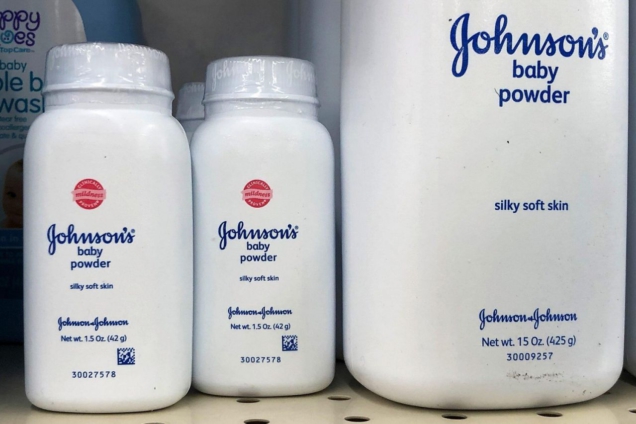Healthcare giant Johnson & Johnson says it will continue to sell its talc-based Johnson's Baby Powder in the UK and the rest of the world, despite stopping sales in the US and Canada.
It said North American sales had shrunk partly because of a "constant barrage" of advertising by lawyers seeking clients to claim against the company.
J&J has been at the centre of claims for years that its talc causes cancer.
It has always strenuously defended the product's safety.
Johnson & Johnson has been ordered to pay out billions of dollars in compensation, but has so far always successfully appealed against these verdicts.
Almost 20,000 people in the US have so far lodged claims against the company.
Talc is mined from the earth and is found in seams close to that of asbestos, a material known to cause cancer.
The company said in a statement: "Johnson & Johnson remains steadfastly confident in the safety of talc-based Johnson's Baby Powder."
It said "decades" of study by medical and legal experts around the world supported its view, and all verdicts against the company that had gone against it had been overturned on appeal.
Dampened demand
It will continue to sell its talc-based products in the US and Canada until stocks have sold out.
It also sells a cornstarch-based powder which it will continue to sell in North America.
It said both types of Johnson's baby powder, talc-based and cornstarch-based, will continue to be sold in other markets around the world where there is "significantly higher" consumer demand for the product.
The firm said changes in consumer behaviour had also dampened demand for the powder.
The firm added that the move was also part of a reassessment of its consumer products prompted by the coronavirus pandemic.
It said in October that its testing had found no asbestos in its baby powder after tests conducted by the US Food and Drug Administration discovered trace amounts.
The firm is appealing against a 2018 order to pay $4.7bn (£3.6bn) in damages to 22 women who alleged that its talc products caused them to develop ovarian cancer.
Latest Stories
-
Gold Fields Ghana Foundation challenges graduates to maximize benefits of community apprenticeship programme
40 mins -
GBC accuses Deputy Information Minister Sylvester Tetteh of demolishing its bungalow illegally
52 mins -
Boost for education as government commissions 80 projects
1 hour -
NAPO commissions library to honour Atta-Mills’ memory
1 hour -
OmniBSIC Bank champions health and wellness with thriving community walk
1 hour -
Kora Wearables unveils Neo: The Ultimate Smartwatch for Ghana’s tech-savvy and health-conscious users
1 hour -
NDC supports Dampare’s ‘no guns at polling stations’ directive
1 hour -
Police officer interdicted after video of assault goes viral
2 hours -
KNUST’s Prof. Reginald Annan named first African recipient of World Cancer Research Fund
2 hours -
George Twum-Barimah-Adu pledges inclusive cabinet with Minority and Majority leaders
2 hours -
Labourer jailed 5 years for inflicting cutlass wounds on businessman
2 hours -
Parliament urged to fast-track passage of Road Traffic Amendment Bill
2 hours -
Mr Daniel Kofi Asante aka Electrician
3 hours -
Minerals Commission, Solidaridad unveils forum to tackle child labour in mining sector
3 hours -
Election 2024: Engagement with security services productive – NDC
3 hours

